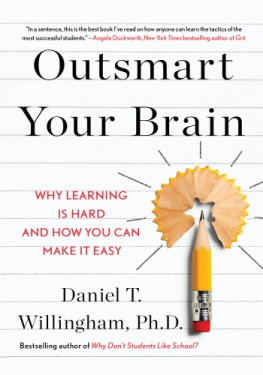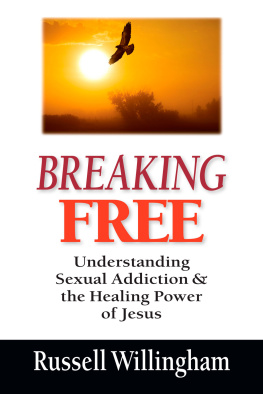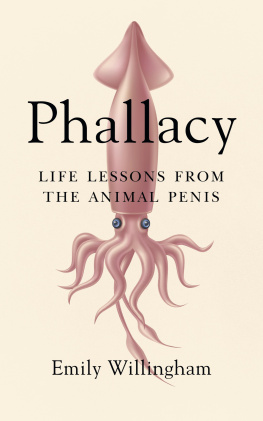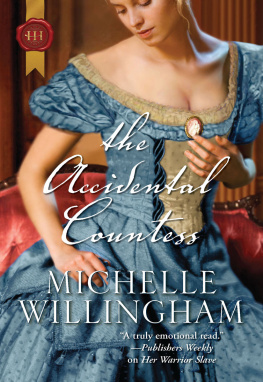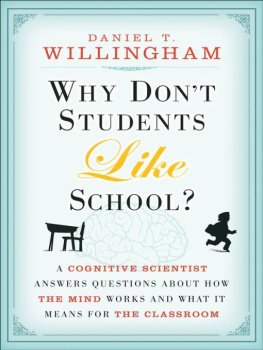Willingham Daniel T. - A Cognitive Approach to Understanding How the Mind Reads
Here you can read online Willingham Daniel T. - A Cognitive Approach to Understanding How the Mind Reads full text of the book (entire story) in english for free. Download pdf and epub, get meaning, cover and reviews about this ebook. year: 2017, genre: Children. Description of the work, (preface) as well as reviews are available. Best literature library LitArk.com created for fans of good reading and offers a wide selection of genres:
Romance novel
Science fiction
Adventure
Detective
Science
History
Home and family
Prose
Art
Politics
Computer
Non-fiction
Religion
Business
Children
Humor
Choose a favorite category and find really read worthwhile books. Enjoy immersion in the world of imagination, feel the emotions of the characters or learn something new for yourself, make an fascinating discovery.

- Book:A Cognitive Approach to Understanding How the Mind Reads
- Author:
- Genre:
- Year:2017
- Rating:3 / 5
- Favourites:Add to favourites
- Your mark:
- 60
- 1
- 2
- 3
- 4
- 5
A Cognitive Approach to Understanding How the Mind Reads: summary, description and annotation
We offer to read an annotation, description, summary or preface (depends on what the author of the book "A Cognitive Approach to Understanding How the Mind Reads" wrote himself). If you haven't found the necessary information about the book — write in the comments, we will try to find it.
A Cognitive Approach to Understanding How the Mind Reads — read online for free the complete book (whole text) full work
Below is the text of the book, divided by pages. System saving the place of the last page read, allows you to conveniently read the book "A Cognitive Approach to Understanding How the Mind Reads" online for free, without having to search again every time where you left off. Put a bookmark, and you can go to the page where you finished reading at any time.
Font size:
Interval:
Bookmark:
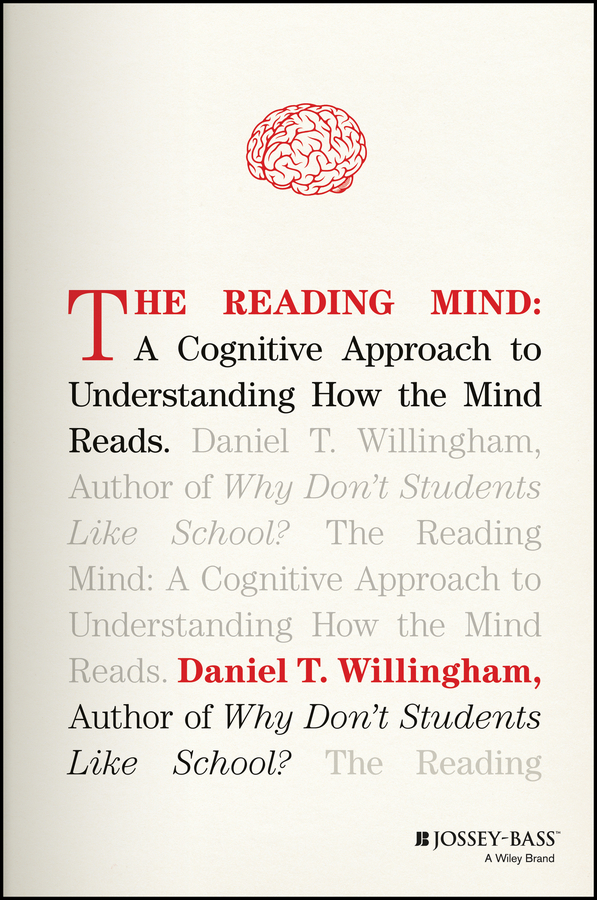
- Chapter 01
- Chapter 06
- Chapter 07
- Conclusion
- Introduction
- Chapter 01
- Chapter 02
- Chapter 03
- Chapter 04
- Chapter 05
- Chapter 06
- Chapter 07
- Conclusion
Daniel Willingham pulls back the curtain on the fascinating process of reading, explaining the discoveries of cognitive science in clear, accessible prose. For the many fans of Why Don't Students Like School, Willingham's new book offers more of the rigorous yet enjoyable science writing we love.
Annie Murphy Paul, author of The Brilliant Blog
This is a superb book. Willingham's ability to make cognitive research on reading coherent and comprehensible is exceptional. I wish that it had been available when I taught courses about research on reading to education doctoral students. This book should be standard fare in every doctoral education course on reading.
Isabel L. Beck, professor emerita, School of Education, University of Pittsburgh
What goes on in the mind as we read? How do people learn to read? What motivates some to read more than others? Does reading online differ from reading books? For those curious about these questions, and for those who care about children learning to read and growing as readers, this delightful, easytoread book explains this highly complex topic through fascinating studies and lively examples. With probing questions after each chapter, The Reading Mind will make a terrific book club read or textbook.
Ellen McIntyre, dean and professor, College of Education, University of North Carolina, Charlotte
This is the book we've been waiting for. Willingham captures the magic of reading while simultaneously demystifying how we read. He brings key experimental findings to light as he takes us on the journey from recognizing individual words to constructing meaning from text. Beautifully written, clear and accessible, yet still embracing complexities rather than shying away from themthis book is essential reading for anyone interested in how we read.
Kate Nation, professor of Experimental Psychology, University of Oxford; fellow and tutor in Psychology, St. John's College
Yet again, Daniel Willingham proves himself genius extraordinaire at translating research to practice! At once a brilliant tutorial on how the bitwise investigations of the research lab have evolved into the ever more powerful and comprehensive models that now dominate cognitive science, and a blueprint for educational excellence, this book is a must for educational practitioners, policymakers, and students. No more topdown versus bottomup reading wars: language, literacy, and knowledge are all of one piece and so, too, must be their development.
Marilyn Jager Adams, visiting scholar at Brown University
Dan Willingham has done it again! This is another of his essential books for educational professionals, and anyone else interested in the reading processsharing the cognitive science and practical implications of research in the domain of reading. No one does this kind of book better than Willingham!
Keith Stanovich, author of Progress in Understanding Reading and The Rationality Quotient
This book is like a Malcolm Gladwell for anyone who is fascinated with how the mind works in literacy development. Willingham mixes his wonderful sense of humor with examples that are simply fun to read while conveying very important concepts about reading. Students will love it; parents will understand it; and scholars will wish that they wrote it!
Susan B. Neuman, professor of childhood education and literacy development, New York University
The Reading Mind is an indispensable exploration of not only how we read, but why we read. An easy and entertaining read that draws on the science of the brain, books, and behavior, Willingham's work will deepen your understanding of the many facets of reading and literacy, as well as how the brain processes what amounts to an astoundingly complex and historically unlikely process. The Reading Mind should be required reading for anyone with a vested interest in the written word.
Kristofor Lauricella, history teacher, High School for Youth & Community Development, Brooklyn, New York
DANIEL T. WILLINGHAM

Copyright 2017 by Daniel T. Willingham. All rights reserved.
Published by JosseyBass
A Wiley Brand
One Montgomery Street, Suite 1000, San Francisco, CA 941044594www.josseybass.com
No part of this publication may be reproduced, stored in a retrieval system, or transmitted in any form or by any means, electronic, mechanical, photocopying, recording, scanning, or otherwise, except as permitted under Section 107 or 108 of the 1976 United States Copyright Act, without either the prior written permission of the publisher, or authorization through payment of the appropriate percopy fee to the Copyright Clearance Center, Inc., 222 Rosewood Drive, Danvers, MA 01923, 9787508400, fax 9786468600, or on the Web at www.copyright.com. Requests to the publisher for permission should be addressed to the Permissions Department, John Wiley & Sons, Inc., 111 River Street, Hoboken, NJ 07030, 2017486011, fax 2017486008, or online at www.wiley.com/go/permissions.
Limit of Liability/Disclaimer of Warranty: While the publisher and author have used their best efforts in preparing this book, they make no representations or warranties with respect to the accuracy or completeness of the contents of this book and specifically disclaim any implied warranties of merchantability or fitness for a particular purpose. No warranty may be created or extended by sales representatives or written sales materials. The advice and strategies contained herein may not be suitable for your situation. You should consult with a professional where appropriate. Neither the publisher nor author shall be liable for any loss of profit or any other commercial damages, including but not limited to special, incidental, consequential, or other damages. Readers should be aware that Internet Web sites offered as citations and/or sources for further information may have changed or disappeared between the time this was written and when it is read.
JosseyBass books and products are available through most bookstores. To contact JosseyBass directly call our Customer Care Department within the U.S. at 8009567739, outside the U.S. at 3175723986, or fax 3175724002.
Wiley publishes in a variety of print and electronic formats and by printondemand. Some material included with standard print versions of this book may not be included in ebooks or in printondemand. If this book refers to media such as a CD or DVD that is not included in the version you purchased, you may download this material at http://booksupport.wiley.com. For more information about Wiley products, visit www.wiley.com.
Library of Congress CataloginginPublication Data
Names: Willingham, Daniel T., author.
Title: The reading mind : a cognitive approach to understanding how the mind reads / Daniel T. Willingham.
Description: San Francisco, CA : JosseyBass, 2017. | Includes index.
Font size:
Interval:
Bookmark:
Similar books «A Cognitive Approach to Understanding How the Mind Reads»
Look at similar books to A Cognitive Approach to Understanding How the Mind Reads. We have selected literature similar in name and meaning in the hope of providing readers with more options to find new, interesting, not yet read works.
Discussion, reviews of the book A Cognitive Approach to Understanding How the Mind Reads and just readers' own opinions. Leave your comments, write what you think about the work, its meaning or the main characters. Specify what exactly you liked and what you didn't like, and why you think so.

